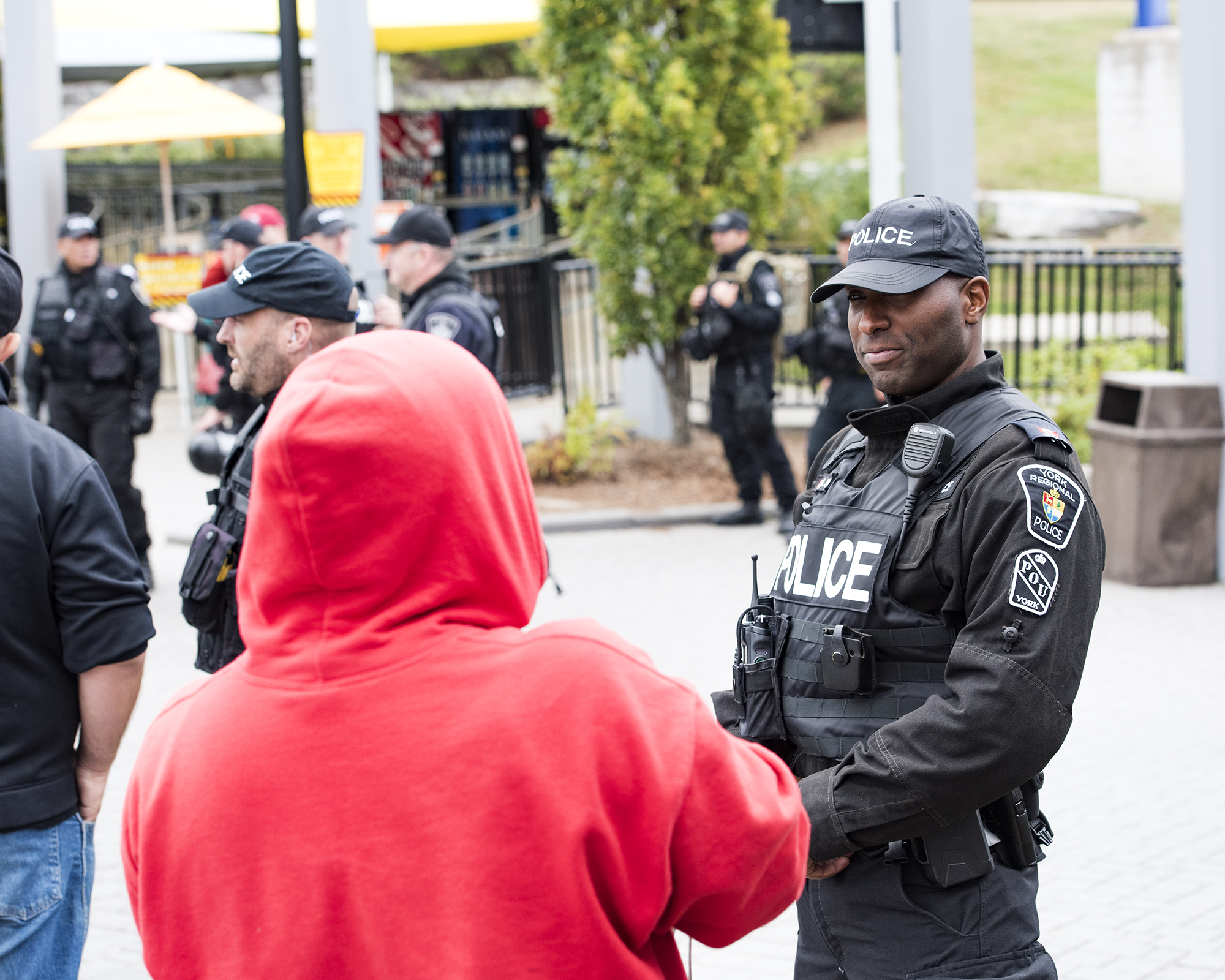Emergency? Call 9-1-1
Non-Emergency? Call 1 (866) 876-5423
- Request a Paid Duty
- Find Crime in my Area
- Find My Local Police District
- Help Solve a Murder
- Report a Crime Online
- Get a Police Record Check
- Get Crime Prevention Tips
- Learn about YRP's Units/ Sections
- Register my Bike
- Submit a Complaint Against a Member
- Submit a Compliment
- View Current Motor Vehicle Collisions
- Work for YRP
- Volunteer with YRP
About protests, rallies and demonstrations
York Regional Police believes in the fundamental right to peaceful freedom of expression as guaranteed by the Charter of Rights and Freedoms and the Human Rights Code.
The Charter guarantees certain rights and fundamental freedoms afforded to all citizens. It states that everyone has the freedom of conscience and religion, the freedom of thought, belief, opinion and expression, including freedom of the press and other media of communication.
The Charter also guarantees the freedom of peaceful assembly and peaceful association.
Our officers will balance these rights with our citizens' right to a safe environment.

Role of police at protests, demonstrations and rallies
The primary role of York Regional Police in any public protest or demonstration is to keep the peace. Police will limit their involvement to safeguarding the fundamental rights of citizens guaranteed by the Canadian Charter of Rights and Freedoms and the Human Rights Code.
Officers will maintain neutrality and impartiality when dealing with any participants involved in a protest and ensure that all parties involved are able to exercise their legal rights where possible.
Freedom of expression does not extend to protect threats of violence or acts of violence. It would not protect the destruction of property, assaults, or other clearly unlawful conduct.
Hate crime and hate/bias incidents
York Regional Police will not tolerate any form of hate crime or the threat of violence against anyone. All reports of hate crime or hate/bias incidents will be investigated thoroughly.
If you witness or have been the victim of a hate crime or hate/bias incident, report it to York Regional Police immediately.
More information on hate and bias incidents can be found on our Hate Crime page.
Police response to threats to safety or criminal activity
York Regional Police officers are specially trained in responding to situations involving public protests or demonstrations and they are ready to respond if necessary.
We work closely with the Royal Canadian Mounted Police and the Integrated National Security Enforcement Team (INSET) to ensure global events do not translate to a local security threat, and York Regional Police monitors world events that could have an impact on residents in our region.
Frequently asked questions
|
What is the difference between public and private property? |
|
In the context of a demonstration, public property means property owned by the federal, provincial or municipal government, or one of its agencies, divisions or entities. It includes parks, streets, sidewalks, schools, libraries and other property regularly used by members of the public. Private property refers to property owned by an individual, corporation or other non-public entity. Owners of private property have exclusive legal rights to the property. |
| When should police be called? |
|
Police should be called if there is a risk to public safety, there has been, or is about to be, a breach of the peace or a criminal offence has been committed. In an emergency, call 9-1-1. In non-emergency situations, call the non-emergency line toll free at 1-866-876-5423. |
| What is an injunction and can police enforce an injunction? |
|
An injunction is a civil court order that commands or prevents an action by a party to a dispute. Sheriffs generally enforce injunctions, however, police may assist them if necessary. The role of police in this regard is to keep the peace. |
|
I am planning a demonstration, rally or protest. Should I let YRP know? |
|
All demonstration, protest and rally planning should begin with submitting a Notice of Demonstration/Protest/Labour Dispute information form. There is no cost associated to this service and no permit is required to host a demonstration, protest, rally or labour dispute. Please complete this form to notify York Regional Police at least one week in advance. For more information from York Regional Police about rallies, protests and demonstrations, please email demonstrations@yrp.ca. |
|
What are the limitations of my freedom of expression? |
|
The Supreme Court of Canada has recognized that "freedom of expression does not extend to protect threats of violence or acts of violence. It would not protect the destruction of property, assaults, or other clearly unlawful conduct." Sections of the Criminal Code of Canada outline certain limitations:
|











